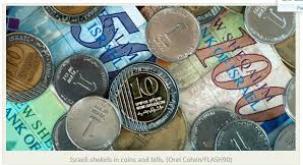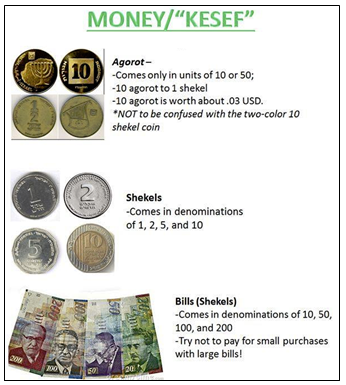Money Matters
Info and tips for all things cash related.

You should bring around 300$ in cash to Israel.
You can order shekels from your bank here before you leave, but it is easier to exchange in Israel. Avoid changing too much money in the airport; exchange rates are bad there. However, you may want to change ~$50 to shekels for transportation to where you are staying. The busses only accept cash. The all-gold coin is called Agarot, and it is worth 1/10 of a shekel, or the equivalent of about 2 cents. Most vendors won't accept them at all, although they can be used on the bus. The rest of the coins and the bills have their amount written on them.

Currency
The currency of Israel is the New Israeli Shekel (NIS, or ₪).
Bills – 20, 50, 100, 200
Coins – 10 Agorot (100 agorot = 1 shekel; aka 1 agorot coin = approx. 10¢ USD); half shekel; 1 shekel; 2 shekel; 5 shekel; 10 shekel
(Note: do NOT confuse the 10 agorot coin with the 10 shekel coin! The 10 shekel coin is easily identified by the two colors.)
Paying Cash vs. Card
Vendors (especially street vendors) can be reluctant to take large bills (i.e. 200 shekel). You can try to:
split the large bills at grocery stores, pharmacies, restaurants, etc. You can pay by card at places like: hotels, most sit-down restaurants, most shops, grocery stores. You cannot use a card, for example, in an open air market (or the “shuk”).
If you are making a small purchase, cash is preferred.
Banks in Israel
Large banks include HaPoalim, Leumi, Discount, Mizrahi-Tefahot, among others.
ATMs
ATMs are ubiquitous in Israel. We recommend that you use only official bank ATMs. With a debit card, the ATM gives you the desired amount of shekels and your home account is debited at the current exchange rate. Note that there may be a limit on how much money you are allowed to withdraw each day and that service charges are usually applied. Make sure you have enough cash in rural areas, villages, and small towns where ATMs may be harder to find. Your own bank probably charges a fee for using ATMs abroad, but some apply no foreign transaction fees. The foreign bank you use may also charge a fee. Nevertheless, you usually get a better rate of exchange at an ATM than in a bank.
ATMs (Pin Codes)
PIN codes with more than four digits aren’t recognized at ATMs in Israel. If yours is longer, remember to change it before you leave.
Credit/Debit Cards
You should bring multiple credit and/or debit cards with you to Israel. Let your bank know that you are traveling abroad – or else they may suspend your card. Keep all your credit-card numbers and phone numbers to call if your cards are lost or stolen in a safe place. Some students temporarily add their parents as a joint account holder, to deal with any problems that may arise during your time abroad with the bank.
Many banks now assess a 1% to 3% "transaction fee" when withdrawing money on all charges you incur abroad (whether you're using the local currency or your native currency).
Tipping
The going rate for tipping in Israeli restaurants and cafes is between 10-15% depending on how pleased (or not) you are with your waiter/waitress. 10% is usually the minimum, with 12% an average tip. You do not have to tip taxi drivers, although you should round up (if your ride is 38 shekels and you hand the driver a 40, you can allow the extra 2 shekels as “the tip.”)
Most important of all... that little line below your total on your restaurant credit card receipt? It's not for your tip. In the US this line usually lets you add in a tip to your credit card total, but here this line on your credit card receipt is for your telephone number. You should not provide your telephone number. If you want to tip at a restaurant, you should tip in cash.

